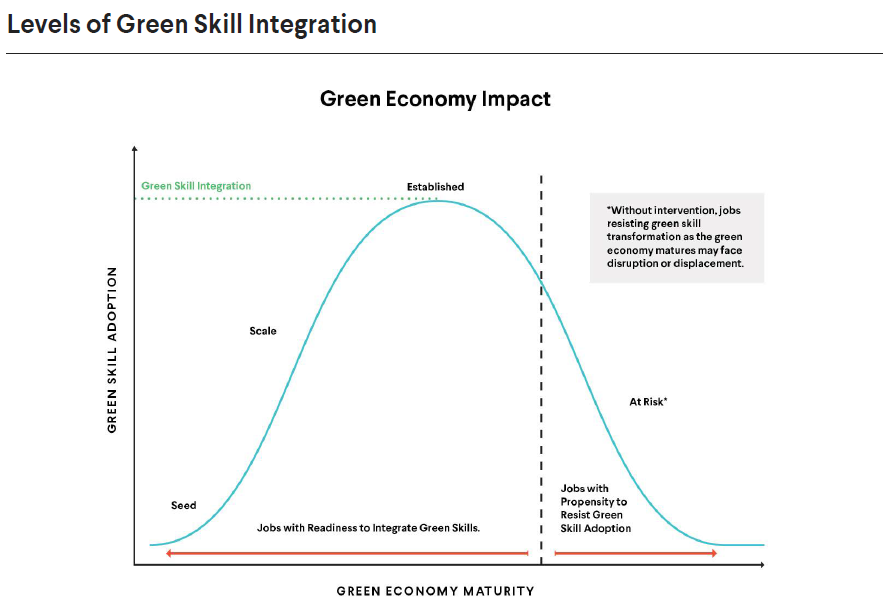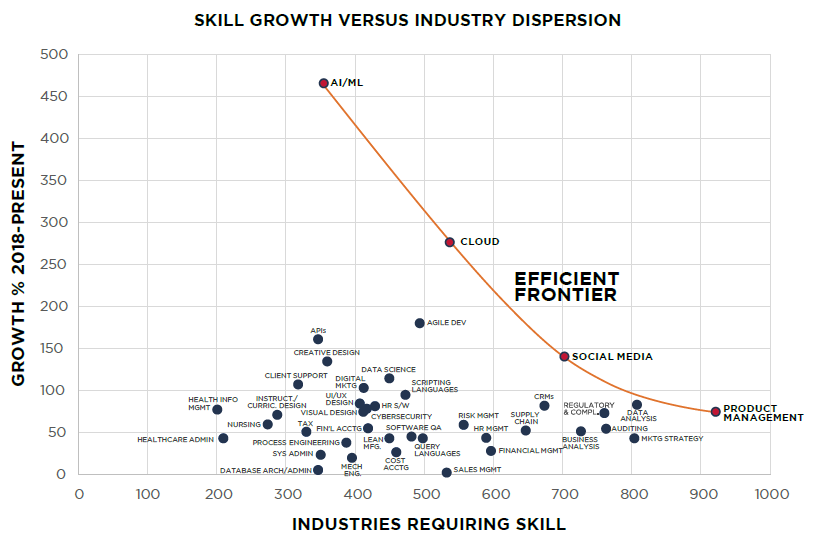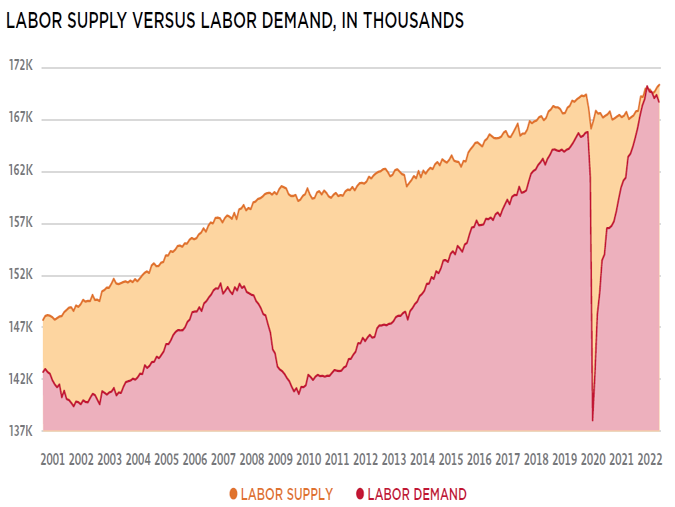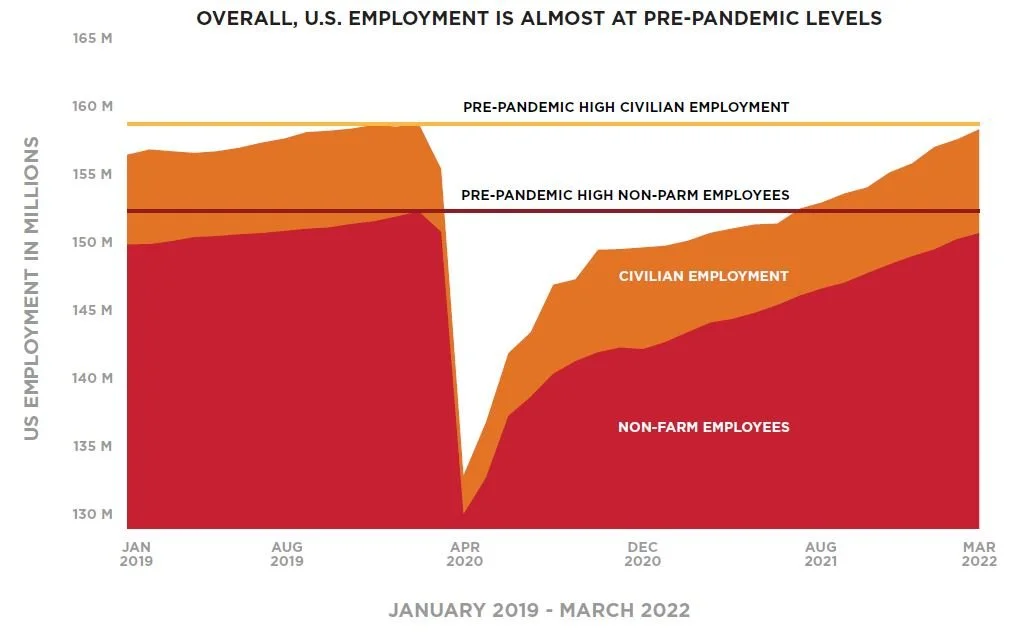Research
Selected research published by the Burning Glass Institute independently or in partnership with other leading workforce innovation and higher education organizations

Growing Quality Green Jobs
Combating climate change and the ripple effects of its impact is one of the major imperatives of our time. As extreme weather, resource shortages, and other challenges worsen, the U.S. economy is gradually shifting in response. While demand is increasing for well-known green job roles such as solar photovoltaic installer, environmental scientist, and electric vehicle technician, there are currently only 900,000 estimated green jobs within the United States, representing just 0.6% of the workforce. They also represent sectors that lack critical representation from the populations that climate change is hurting the most: people from low-income communities, people of color, and people from rural areas.
Indeed, it’s becoming increasingly clear that our country faces multiple, interrelated climate challenges. A transition to a green economy is not happening quickly enough to minimize significant health hazards brought on by climate change, nor is it building equitable resilience against devastating and ongoing natural disasters impacting communities nationwide. Emerging green jobs that could provide a foundation for change—particularly those that demand science, technology, engineering, and math skills—tend to require at least a bachelor’s degree and lack entry-level roles or clear pathways for people from underserved and underrepresented populations. A truly just transition to a green economy requires solutions that not only limit the root causes of our warming planet but also lead to accessible, equitable, and quality jobs for a sustainable future…

Making the Bachelor’s Degree More Valuable
The bachelor’s degree is facing an identity crisis.
In the last year and a half, Maryland, Pennsylvania, and Utah have stopped requiring a four-year degree for most jobs in their state governments. The private sector, too, has moved toward skill-based hiring, with Delta, General Motors, Google, Apple, and IBM, among others, dropping the B.A. prerequisite for many positions. Even the federal government is urging its agencies to rely on job-seekers’ skills rather than the sheepskin to fill vacancies.
As we show in this paper, the B.A. remains a valuable commodity in the job market. But colleges and universities can no longer coast on the historical value of the four-year degree to enroll students going forward. The onus is on institutions to make the B.A. more valuable in a marketplace where it faces competition from microcredentials, industry-based certificates, and increasingly well-paying jobs that don’t require a four-year degree.

U.S. Labor Market Outlook March 2023
This is what happens when an unstoppable force meets an immovable object.
In the March 2023 edition of the Burning Glass Institute Labor Market Outlook, we will provide an outlook for the US economy and labor market before focusing in on the pandemic’s main long-term impact.
2022 taught us that the demand for US workers was more unstoppable and the labor supply more immovable than we had expected. That is, on the one hand, demand for talent remained strong despite rapidly rising wages while, on the other, the lure of high pay and greater flexibility in work did little to draw workers back to the market. The result is a labor market that has remained tight, driving further upward wage and inflation pressure.

2023 Skills Compass Report
Our report on strategic skills planning for upskilling and reskilling the workforce.
For many years we’ve been observing that jobs and organizations have been trending towards disruption, upheaval, and accelerated change. COVID-19 has dramatically increased the speed at which technology is fundamentally changing business. One major effect on this is on the rate of disruption for jobs. The World Economic Forum predicts that 85 million jobs will be displaced by 2025, which means they just simply won’t exist due to algorithms or new technologies. More shockingly, 40% of what organizations now deem core skills will change by 2025
The 2023 Skills Compass Report has been created to help leaders build meaningful learning programs and skill planning strategies by helping define and prioritize skills requirements by understanding the intersection of time to skill, skill value, and skill longevity, inform their build vs. buy learning strategy to design more effective learning programs, drive digital literacy to upskill and reskill talent, and justify the ROI for specific skills to help leaders resource strategic learning initiatives.

How Skills Are Disrupting Work
Our report on the transformational power of fast-growing, in-demand skills.
In 2021, one in eight job postings featured four skill sets that share two startling common features. These high-demand sets of skills—in Artificial Intelligence/Machine Learning, Cloud Computing, Social Media, and Product Management—are both among the country’s fastest growing and the economy’s most rapidly spreading into new industries. In some industries, skills from these sets are represented in up to a third of all job postings. They are showing up in surging numbers across the workforce, affecting an ever-widening diversity of jobs and industries and, together with similar skill sets, are entirely transforming work as we know it.

U.S. Labor Market Outlook November 2022
Propped up by strong consumer spending on services, healthy business spending on R&D, and the continued recovery of key sectors adjusting to a new normal, the U.S. economy has managed to skirt recession thus far.
But recession isn’t far off. Continued tightness in the labor market will be a key driver of inflation, forcing the Fed to keep raising rates to lower demand for labor.
Even during a recession, labor shortages would linger, particularly in low- and middle-skill occupations where low rates of workforce participation, an aging workforce, and misalignment in the educational contours of the workforce will continue to challenge supply chains.
Labor shortages are not a temporary problem but a persistent challenge that will significantly limit economic growth for the rest of the decade.
Businesses can take reasonable steps to offset the impact of the ongoing labor shortage and to better weather the storm, while policymakers could return the economy to a growth footing through a series of reforms—but only if they can muster unwonted bipartisan resolve to address thorny issues.

The American Opportunity Index
The American Opportunity Index: A Corporate Scorecard of Worker Advancement is a new effort to give companies and other stakeholders a set of robust tools that measure how well major employers are doing in fostering economic mobility for workers and how they could do better. The Index is a joint project of the Burning Glass Institute, Harvard Business School’s Project on Managing the Future of Work, and the Schultz Family Foundation. The Index assesses America’s 250 largest public companies based on real-world outcomes of their employees in roles open to non-college graduates—not merely their statements on corporate policy. It draws upon a new source of insight: bigdata analysis of career histories, job postings, and salary sources of more than 3 million workers at those firms.

A Guide to Improving Recruitment, Retention, Advancement and Equity
Our analysis in partnership with the Business Roundtable and Lightcast on how to enhance workforce inclusion via skills-based talent strategies
U.S. companies have traditionally relied on four-year degree requirements as a critical credential, particularly for white collar jobs, and a proxy for job candidates’ qualifications for roles. This practice has excluded many talented Americans, including employees of color, from hiring and promotion and has made it harder for employers to find a sufficient number of skilled employees.
Increasingly, U.S. companies are shifting their hiring and talent management practices to emphasize the value of skills, rather than degrees alone. Taking a more inclusive approach around educational credentials as a job criterion, where possible, can help companies meet their hiring needs and unlock new employment and advancement opportunities for workers from diverse backgrounds.

Shifting Skills, Moving Targets, and Remaking the Workforce
Our analysis of 15 million job postings illuminates the future of work
Discussions about the job market usually focus on jobs created and destroyed. But even in the most tumultuous times, that is not what most workers or most business experience. Jobs do come and go, but even more significantly, jobs change. For the vast majority of workers, their job is much less likely to go away than to evolve into something new…

The Through-the-Looking-Glass Recovery
New, complex dynamics in the U.S. Economy suggest that employment in some industries won’t come back from the pandemic.
New, complex dynamics in the U.S. Economy suggest that employment in some industries won’t come back from the pandemic.
A permanent shake-up of U.S. industries is underway. While the economy sustained massive, near-instantaneous employment loss in the early days of the pandemic, the job market has now returned to 99% of is prior strength after just two years, far faster than the job market recovered from past shocks. But the economy we have returned to usn’t the same as the one we left behind…

HBR: Skills-Based Hiring Is on the Rise
Two decades ago, companies began adding degree requirements to job descriptions, even though the jobs themselves hadn’t changed. After the Great Recession, many organizations began trying to back away from those requirements.
To learn how the effort is going, the authors studied more than 50 million recent job announcements. The bottom line: Many companies are moving away from degree requirements and toward skills-based hiring, especially in middle-skill jobs, which good for both workers and employers. But more work remains to be done.

The Emerging Degree Reset
Employers are resetting degree requirements in a wide range of roles, dropping the requirement for a bachelor’s degree in many middle-skill and even some higher skill roles. Based on these trends, we project that an additional 1.4 million jobs could open to workers without college degrees over the next five years.

Dynamos for Diversity
For higher education to live up to its diversity imperative, universities need to go beyond an exclusive focus on enrollment numbers and bring more attention to outcomes – both for existing students and for the broader community of learners they’ve been missing.

HBR: Manage Your Talent Pipeline Like a Supply Chain
In supply-chain management, you get what you plan for. It’s time for companies to get serious about developing a good supply chain for talent. Here are ideas for how to get started.
